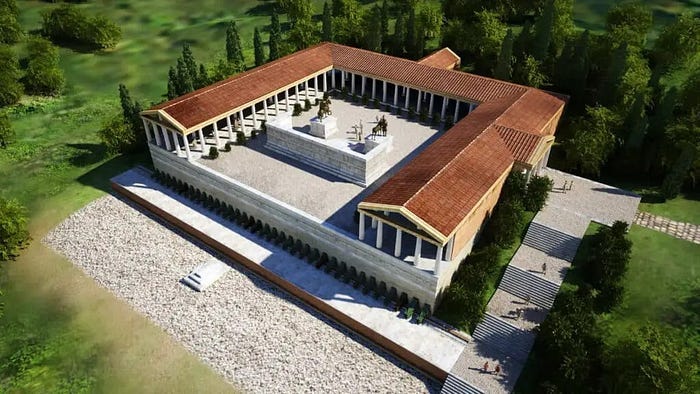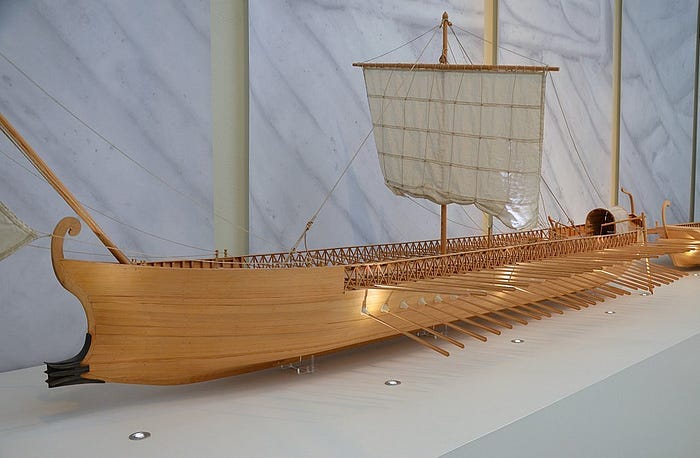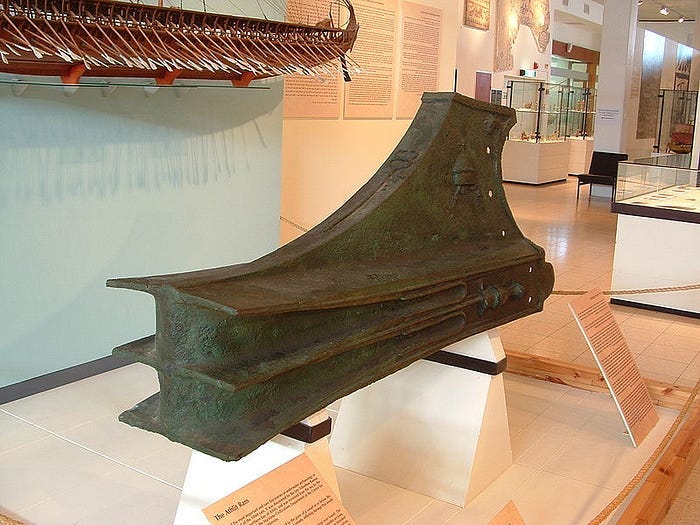Rome's Emperor Octavian Had The Greatest Trophy Room Of All Time
The souvenirs hanging on his wall defy imagination

“The Emperor Caesar, son of the divine Julius, following the victorious outcome of the war he waged for democracy in this region when he was consul for the fifth time and general for the seventh, and after the establishment of peace on sea and land, dedicated to Ares and Poseidon the camp from which he stormed against the enemy, which is now adorned with the spoils of ships”.
— Inscription On Octavian’s Victory Monument, Nicopolis preservation website
In2017, the football team for Philadelphia (The Eagles) finally won a championship after about fifty years of trying. Obviously, the city celebrated. But after the parades, a big question was left unanswered. Where would their trophy be displayed?
After much debate, it was set up in their training center. Namely, so new players could see the results of victory, and potential teammates that the franchise could win a championship. But trophies are bigger than sports. For creators of empires, they could mean a legacy lasting centuries.
Ironically, Alexander The Great himself became a trophy.
His general Ptolemy used his body as a garish scepter of sorts. It justified the Greek rule over Egypt for hundreds of years. In fact, Alexander’s tomb might have been the greatest trophy in the ancient world.
Well, until Octavian’s reign. He took it to a whole new level. Just the inscription (above) on his victory monument was fifty-four meters long, which is over half the length of an American football field to you sports fans.
And while you may have a piece of valuable memorabilia on your wall, Octavian had something mounted on his which boggles the mind. Here’s a hint, it was the ultimate trophy for a sea battle. Although it was only one piece of a massive celebratory victory lap for winning the Roman Empire.
But we need to understand the victory before we get to the historic trophies.
The Aftermath of Caesar
While Julius Caesar’s life often takes center stage in the Roman world, his assassination likely had a larger impact. Namely, a war of succession. Its first phase was between Caesar’s killers in the Senate and those loyal to the former emperor.
Historian Barry Straus in The War That Made The Roman Empire explains the group fighting in memory of Caesar had a shaky alliance.
Mark Antony was Caesar’s right-hand man, often risking his life on the battlefield for the former emperor. He even delivered his boss’ eulogy. Being a powerful speaker, military veteran, and distant cousin of Caesar, Antony saw himself as the ideal successor.
However, something unintended happened — the emperor’s nephew Octavian. Caesar mentored the boy after he lost his father. However, it wasn’t totally out of charity, Octavian impressed his uncle as a rising star. So, Caesar personally trained him on how to win an empire. According to Straus:
“An hour at the feet of Caesar was worth more than a term of lectures by a professor, and Octavian spent many hours there.”
The emperor wrote his eighteen-year-old nephew into his final will. He left most of his fortune to Octavian and posthumously adopted him. Antony was threatened but joined forces with the upstart. The two crushed armies led by the assassins of Caesar and divvied up the empire.
While Antony took the rich Eastern provinces and Gaul, Octavian got possession of Rome. However, each man’s ambition made peace impossible.
War To Replace Caesar
As the years passed, both men gained strength. Antony made the acquaintance of an Egyptian queen Cleopatra — from a long line of Greek nobility — that gave him prestige in the East and an incredible access to money.
But Octavian found a great ally too named Marcus Vipsanius Agrippa.
While Octavian lacked skill on the field of battle, Agrippa more than made up for it, becoming his top general. Straus calls him a “practical genius.” Agrippa also proved to be one of the greatest naval commanders in Rome’s history.
The alliance between Octavian and Antony eventually broke apart as both men positioned for power. A series of naval battles and skirmishes culminated in the battle of Actium in September of 31BC.
According to the Encyclopedia Britannica, Octavian and a force of four-hundred warships and eighty thousand infantry pushed Antony into a battle. He replied with five-hundred ships and seventy-thousand infantry. But the battle wasn’t as even as it appears.
Straus points out Agrippa had been slowly weakening his opponent by a series of smaller naval victories. Antony’s support slowly peeled away. As he waited at Actium, his troops got sick, and even a commander defected giving Octavian part of their battle plan.
It’s also believed Antony couldn’t man all his warships.
While both Antony and Cleopatra escaped the battle, their fleet was crushed, and they’d be dead within a year by their own hands. It left Octavian alone. Or as he preferred to call himself “Caesar.”
The Ultimate Trophies And Trophy Room

While Antony had manpower issues, his ships were excellent. According to Plutarch in The Life of Antony, his fleet was made up mostly of quinqueremes and smaller quadriremes. The former had three levels of oarsmen (three per oar up top, while two on the bottom) and could carry about four hundred men. The latter were smaller with two levels of oars and a pair of men on each.
Overall Antony had much larger ships. Their bows were also reinforced and armed with the traditional Roman bronze ram up front called a “rostrum.” A similar ram found off the coast of Israel weighed about half a ton.
To celebrate his victory at Actium, Octavian created a multi-level victory monument near the location of the battle. It contained altars to the gods Neptune, Mars, and Apollo. Plus, trophies worthy of Actium.
While hunters may collect heads of animals, Octavian collected the bronze rams of Antony’s ships. Thirty-six in all were mounted on a wall at the monument. Thinking of the weight of the previously mentioned ram, it must have been an awe-inspiring sight.

But this was only one piece. Straus explains Octavian created a whole city surrounding the monument called Nicopolis (City of Victory). The city also held celebratory games — like the Olympics — every few years honoring the victory at Actium. It became a pilgrimage site of sorts.
Although Octavian wasn’t done, he made a pilgrimage of his own to knock the greatest emperor of all time down a peg.
Octavian Visits And Replaces Alexander
After defeating the remaining forces of Antony and Cleopatra, Octavian moved into their capital of Alexandria in Egypt. Like any tourist, he visited a monument. His choice was Cleopatra’s ultimate trophy — the tomb of Alexander the Great.
The historian Cassius Dio reports Octavian ordered the sarcophagus of Alexander open, placing a gold crown on his head, and flowers on the body. But he wasn’t done. He touched Alexander’s face, and in doing so broke the nose on the mummified body.
Barry Straus thinks the story so sensational that Octavian might have created it. According to Straus:
“Would Sigmund Freud himself have dared to tell such a tale? Just short of his thirty-third birthday Octavian was precisely the age Alexander had been when he died. By accidentally breaking off a piece of the nose…Octavian was saying…he was greater”.
It makes sense in a way. The new emperor also took part in three back-to-back triumphs (military parades) upon his return to Rome. Something that had never been seen. So, think about all his trophies
A multi-story victory monument with three dozen thousand-pound rostrums mounted on a wall
A large city in Greece built dedicated to his victory, along with a series of games played there
The trio of consecutive triumphs celebrating his victories
Finally, a story of Octavian diminishing the greatest leader of the ancient world at that point, living beyond Alexander’s years to shepherd the ultimate empire
It makes one think about the many lessons Octavian learned at “the feet of” Julius Caesar. Perhaps one was to surround yourself with trophies. Much like the Eagles’ display, it showed the Romans Octavian was a winner, and worthy of his adopted title of Caesar.
Plus, as Muhammad Ali might remind you, “it’s not bragging if you can back it up.” The rams on the wall, celebrations, and stories did just that.
-Originally posted on Medium 8/15/22


